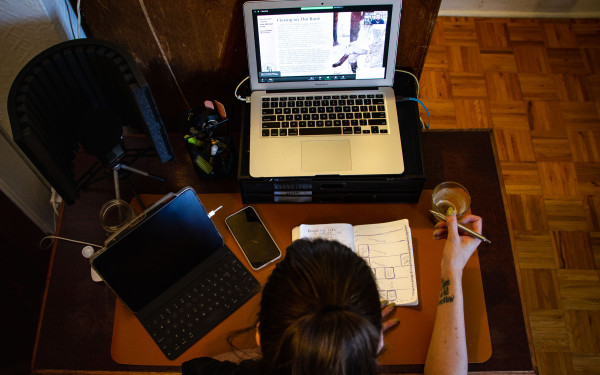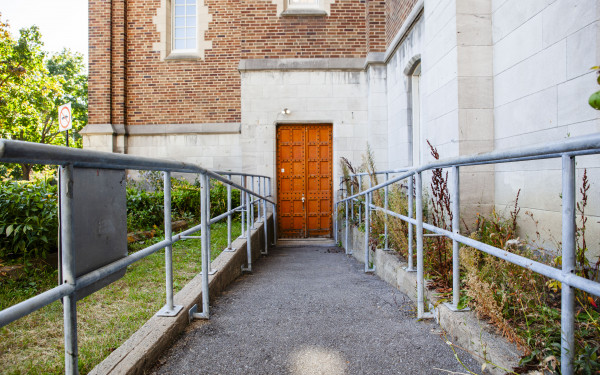The ACSD needs to provide advocacy
How can students with disabilities rely on an organization that doesn’t support them in times of need?
As a student with autism, navigating the educational system is a tedious experience; such as interacting with my peers, meeting expectations from my parents and teachers, and excelling in my schoolwork.
I’ve been in special education throughout the majority of my academic career. At first, I thought I could trust my teachers and my integration aides to guide me through the education system, in addition to providing me with a pleasant experience at school (which was the exact opposite to what I experienced growing up). With my previous fall-out with Concordia’s Access Centre, I realized how inadequate the university’s services could be for students with disabilities.
Openly admitting to receiving special education put a target on my back in the eyes of my peers, and was my academic downfall in the eyes of the administration. Being in special ed indicates that students with disabilities have no guidance or plans for their future, and most of their educational needs aren’t considered. The failure to provide equitable solutions and encouragement results in distrust among students who rely on specialized education services.
As I entered university, I was relieved Concordia had an Access Centre for Students with Disabilities (ACSD) to provide me with accommodations and a community. There would be little pressure for me to get through a high-profile university since the services I rely on would support me throughout the rest of my time here. I sent them essential documents, such as my official autism diagnosis from the children’s hospital.
The Access Centre was created to help students navigate Concordia through a variety of challenges. They provide note-takers for students with mobility problems, quiet exam rooms, granting extensions for assignments and exams, text-to-speech software use, and other forms of accommodation. They also ensure the university follows through their policies of keeping education accessible and supporting students who rely on academic accommodations. The ACSD also provides specialized workshops and internships to students.
Although I’ve benefitted from ACSD’s services, there was a part of me that felt like something was missing.
On Sept. 13, 2022, I received an email from my undergraduate advisor informing me that I must drop three of my core journalism courses because a student applied for graduation during the first week of school. Her email said: “I noticed you’re registered in one too many 400-level journalism courses. I have a student who will be graduating in Winter 2023 and who needs a 400-level course, so I must ask you to drop one of the three courses you’re taking and let me know once it’s done. If you don’t do it yourself, I’ll have to do it in 24 hours from now.”
“24 hours?” Huh?!
I thought I followed the standard of taking my core classes and one minor course to get through a semester. What could I be doing wrong? How can I make such a last-minute decision that could affect the rest of my semester?
It turns out I wasn’t the only one who received this email. Most of my friends in the journalism program got the same email from her. Most of them rejected her request, but for me, I went back-and-forth with her via email. I needed to fight for my education.
I was frantically booking appointments with her to get to the bottom of this issue. I want to keep my classes, I just can’t let anyone pull the rug from underneath my feet! I need those classes to graduate, too! What makes them more important than me?
Writing multiple emails and booking online appointments was mentally draining for me. I spent the next three days with irregular eating habits, losing sleep, crying sporadically and praying for some kind of miracle. It got to a point where one of my friends wanted to write a report on my story, but I was too aggravated to contextualize my emotions in a calm manner. I knew the world wasn't ending soon, but it felt like it.
I emailed my teachers for my upcoming non-consensual removal, and they were willing to take my side. I even had my friends fend for me as well. I wanted to see who else could fight with me on this issue.
I wrote an email to my advisor from the ACSD, optimistic that they can help me settle things with the journalism department. As a student with a disability, I felt like I was discriminated against due to the fact that one student has more of an advantage over me while I was constantly pressured to drop one of my courses, whereas my classmates who weren’t in the Access Centre got to move freely from this issue. I had no other choice.
A day later, I received a call from my ACSD advisor and I vented my frustration at him (which was a huge mistake). Instead of a thoughtful and compassionate response, I was met with rejection. I don’t remember too much of our phone call to understand his reasoning, but I recall him telling me that the Access Centre could not get involved in my issues with the journalism department. All I wanted was help. It turns out that I couldn’t fight for myself against an institution that would jeopardize my chances of graduating.
It brought me back to grade 11, where I was told to not think about graduating since my math grades were low. That other students were excelling more than me, despite being above average in my other classes. I needed to complete my grade 10 math as a requirement to graduate, but my math teacher and academic advisor discouraged me in applying for graduation, saying it wouldn't be possible for me and that I should give others who have “more potential” a chance to graduate.
As someone with a strong work ethic and committed to studying, I thought I had potential to go above and beyond. I needed that math class to graduate, no matter how crappy my grades were.
My spirit was crushed. How can I move from this? Could I still keep my classes without the ACSD’s support? Was I really discriminated against? Was I asking for too much? What’s going to happen next?
By the end of the week, I finally accepted my defeat. I told my undergrad advisor to remove me from a course. After days of pushing and pushing to keep my spot in my classes, I failed myself to fight for my education. The next few weeks were followed by a depressive episode.
Look, I know I spent the majority of time whining about what happened a year ago, but I can't help thinking: “How can I rely on the ACSD in the future?”
As the ACSD urges Concordia to follow the policies of accessibility and inclusivity, the centre also states on the first page of its Procedures on accommodation related to students requesting academic accommodations, claiming they “support students with self-advocacy.” In what circumstances does the ACSD come in to help students? What requirements must students with disabilities need in order to get help from the institution to help them advocate for accessible education?
In my case, I would assume the ACSD could help students in terms of guiding through the sudden changes in their registration. Perhaps the ACSD could provide a different form of support in terms of students experiencing mistreatment from fellow peers and professors.
Although it’s essential for students like me to be offered accommodations to facilitate our experiences on campus, advocacy offers a sense of comfort for students facing difficult challenges from an academic institution that claims to provide a safe, equitable and inclusive environment for their students. Why must we beg for help?
In instances like mine, there’s strength in numbers. I want to know that I’m not fighting this battle alone, as long as I have a strong support system from my friends, teachers and members of the ACSD, I would have pressured my advisor to keep my classes from slipping away from my hands. I’m not asking the ACSD to get fully-involved in my issues, but I would like an institution to legitimize my concerns to school administration to understand my position.
The ACSD should help their students on self-advocacy on issues big or small, as listed in their procedures. I know this was just one example of my kerfuffle with the ACSD, but I hope I wasn’t the only student who felt let down by an organization that was implemented to support them.
Will I continue to rely on ACSD’s services throughout the school year? Yes. Will I continue to participate in their workshops and internships? Absolutely. Until then, I would hope to regain trust in the ACSD in the future if they’re willing to advocate alongside their students.
This article originally appeared in Volume 44, Issue 1, published September 5, 2023.






